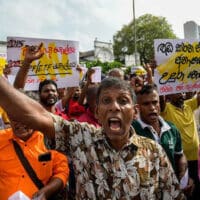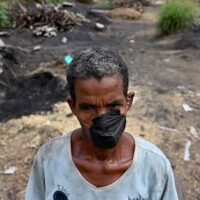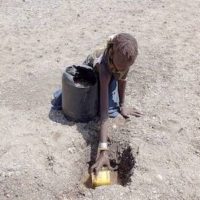-
Sri Lanka’s dangerous domestic debt restructuring
The recent bailout agreement between the International Monetary Fund and Sri Lanka fails to address the economy’s structural problems. Instead, it focuses on highly regressive measures that disproportionately affect the working poor and are likely to exacerbate the country’s ongoing debt distress.
-
Achieving Earth for all
Because the changes needed to achieve sustainable well-being for everyone are so big, they require determined social movements with wide participation. But while history shows that inertia and defeatism can become self-fulfilling, it also shows that governments ultimately have to respond to popular pressure–or be replaced by it.
-
Apocalypse or cooperation?
The perfect storm of COVID-19 and climate change, and the resulting economic damage, will most likely trigger much more social and political instability. Although substantially increased international cooperation can still avert this nightmarish scenario, the current state of global politics provides few grounds for optimism.
-
Vaccine apartheid
These hopes may not last long. The announcement has sent governments scrambling to lay claim to vaccine doses, apparently realizing a bleak prediction: wealthy countries and individuals will monopolize early doses of any effective vaccine.
-
The COVID-19 debt deluge
How long the COVID-19 crisis will last, and what its immediate economic costs will be, is anyone’s guess. But even if the pandemic’s economic impact is contained, it may have already set the stage for a debt meltdown long in the making, starting in many of the Asian emerging and developing economies on the front lines of the outbreak.
-
The growing threat of water wars
In 2015, United Nations member states adopted the Sustainable Development Goals, which include an imperative to “ensure availability and sustainable management of water and sanitation for all.” Yet, in the last four years, matters have deteriorated significantly.
-
Jayati Ghosh Says More…
“Economic policy globally has become heavily distorted in favor of the rich, with governments increasingly beholden to corporate interests, and thus highly resistant to progressive policies.”
-
The IMF’s latest victims
In 2013, the International Monetary Fund produced a report acknowledging that it had “underestimated” the effects that austerity would have on Greece’s economy. Yet the Fund has made the same mistakes in its subsequent deals with Argentina and Ecuador.
-
The exploitation time bomb
Worsening economic inequality in recent years is largely the result of policy choices that reflect the political influence and lobbying power of the rich. There is now a self-reinforcing pattern of high profits, low investment, and rising inequality–posing a threat not only to economic growth, but also to democracy.
-
The political roots of falling wage growth
It’s now official: workers around the world are falling behind. The International Labor Organization’s (ILO) latest Global Wage Report finds that, excluding China, real (inflation-adjusted) wages grew at an annual rate of just 1.1% in 2017, down from 1.8% in 2016. That is the slowest pace since 2008.










